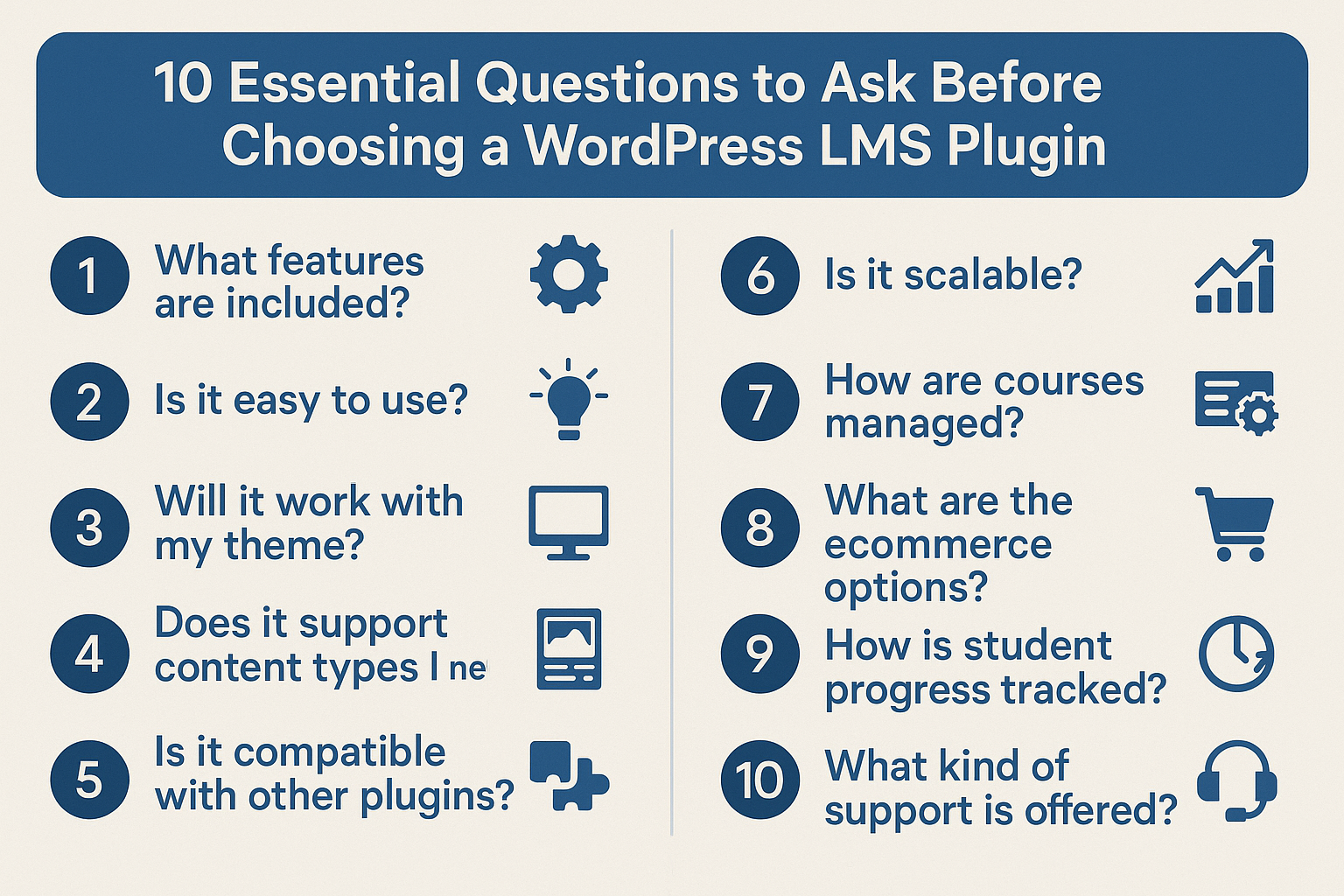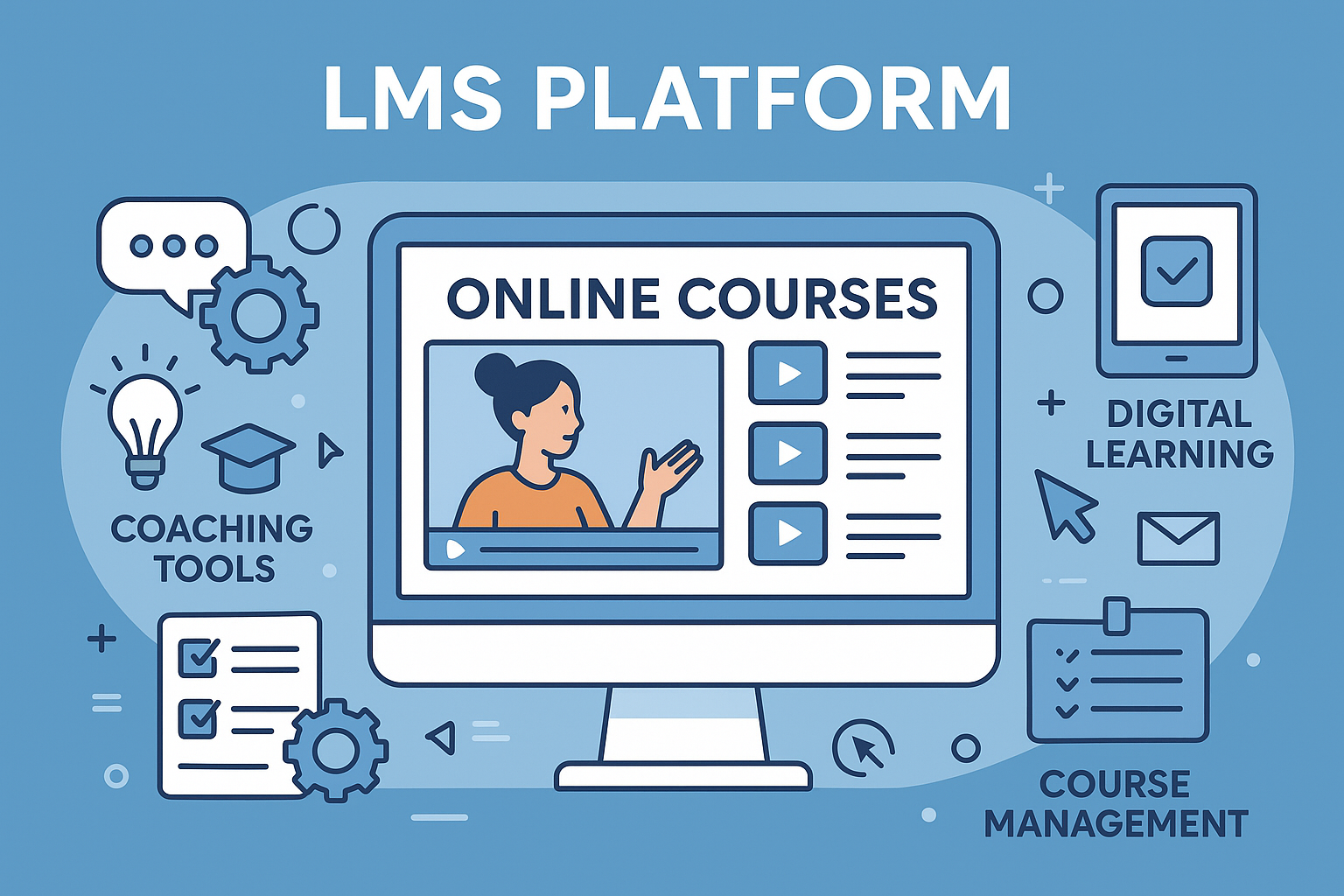Introduction
Creating and selling online courses is a powerful opportunity for coaches, trainers, and independent experts who want to monetize their knowledge. Thanks to WordPress, you can build a full-fledged online learning platform—even without advanced technical skills—by using WordPress LMS Plugin plugins like LearnDash, Tutor LMS, or LifterLMS.
But not all plugins are created equal, and more importantly, not all of them fit your specific needs. Before diving in, you need to ask the right questions. Here are 10 key ones to help you choose the best LMS plugin for your project.
1. What type of content will you offer?
Will your course include videos, PDFs, quizzes, live webinars, or downloadable resources? Each LMS handles these formats differently.
- LearnDash is great for structured learning with quizzes and video controls.
- Tutor LMS offers a user-friendly editor and makes video integration easy.
- LifterLMS provides flexible support for various media and downloadable content.
👉 Start by identifying your content formats to ensure compatibility.
2. How do you want to structure your courses?
Will you create a single course, a modular program, or a complete online academy?
- LifterLMS allows detailed structuring with sections, lessons, and exams.
- LearnDash offers “courses,” “lessons,” and “topics” for complex setups.
- Tutor LMS is simpler but ideal for standard course delivery.
👉 Define your course layout upfront to choose a plugin that fits.
3. Do you want to include quizzes, assignments, or certificates?
Quizzes help with engagement and retention. Certificates can increase motivation and satisfaction.
- Tutor LMS supports multiple quiz types (MCQs, true/false, short answers).
- LearnDash offers advanced quiz features, including timed tests and question banks.
- LifterLMS allows graded assignments and auto-issued certificates.
👉 These features can improve learner engagement and completion rates.
4. Do you need a community or discussion space?
Creating a community around your course can boost interaction and retention.
- LifterLMS integrates well with BuddyPress or bbPress for forums.
- Tutor LMS includes built-in Q&A features between students and instructors.
- LearnDash can be extended with community-focused plugins.
👉 Consider this if peer interaction is key to your teaching style.
5. How do you want to sell your courses?
One-time payments, subscriptions, course bundles, or free previews—all affect your plugin choice.
- LearnDash and LifterLMS integrate easily with WooCommerce, Stripe, and PayPal.
- Tutor LMS also supports various monetization methods and works with EDD and WooCommerce.
- Some plugins offer built-in coupon, discount, and affiliate systems.
👉 Choose a plugin that matches your pricing and sales strategy.
6. Do you need content drip or access control?
Drip content lets you release lessons gradually—great for maintaining student engagement over time.
- LearnDash offers detailed drip settings (by date, progress, or actions).
- LifterLMS supports drip content and course prerequisites.
- Tutor LMS includes drip features in its pro version.
👉 Essential for long-term or cohort-based learning programs.
7. What user experience do you want to deliver?
Your students expect a clean, intuitive, and mobile-friendly learning interface.
- Tutor LMS is known for its modern and smooth UI.
- LearnDash offers full customization but needs some setup time.
- LifterLMS strikes a balance between functionality and ease of use.
👉 Put yourself in your learners’ shoes when choosing the interface.
8. What’s your technical skill level?
Some LMS plugins are easier to set up than others.
- Tutor LMS is beginner-friendly with a clear dashboard and setup wizard.
- LearnDash is more advanced but offers great flexibility once configured.
- LifterLMS is well-documented but some features may require tech know-how.
👉 Choose a tool you feel comfortable managing—or get support.
9. What kind of support and community do you need?
When issues arise, reliable support can save time and frustration.
- LearnDash has a large, active community and solid technical support.
- LifterLMS offers excellent documentation and responsive customer service.
- Tutor LMS has a knowledge base and email support available.
👉 Look for a plugin with an active user base and responsive help.
10. What is your current and future budget?
Costs vary greatly depending on features and add-ons.
- Tutor LMS offers a free version with many core features.
- LearnDash and LifterLMS are premium plugins with robust capabilities.
- Don’t forget hidden costs: payment gateways, themes, extensions, and maintenance.
👉 Consider both short-term affordability and long-term value.
Conclusion
Choosing the right LMS plugin for WordPress is a strategic decision. It’s not about picking the most popular tool—it’s about finding the one that aligns with your content, your learners, and your business goals. By answering these 10 essential questions, you’ll build a solid and scalable online training system.
Key Takeaways
- Define your course content and structure clearly.
- Prioritize features based on your teaching and monetization needs.
- Focus on user experience—for both you and your students.
- Think ahead about support, scalability, and total costs.
Your Turn
- Which LMS plugin have you tried or are considering—and why?
- What features matter most to you when building an online course platform?


